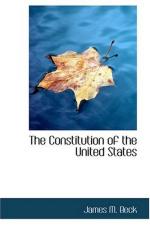At times the debate became bitter in the extreme. James Wilson, a delegate of Pennsylvania and a Scotchman by birth and education, turning to the representatives of the little States, passionately said:
“Will you abandon a country to which you are bound by so many strong and enduring ties? Should the event happen, it will neither stagger my sentiments nor duty. If the minority of the people refuse to coalesce with the majority on just and proper principles, if a separation must take place, it could never happen on better grounds.”
He referred to the demand of the larger States that representation should be proportioned to the population. To this Bedford, of Delaware, as heatedly replied;
“We have been told with a dictatorial air that this is the last moment for a fair trial in favour of good government. It will be the last, indeed, if the propositions reported by the committee go forth to the people. The large States dare not dissolve the convention. If they do, the small ones will find some foreign ally of more honour and good faith, who will take them by the hand and do them justice.”
Finally, the smaller States gave their ultimatum to the larger States that unless representation in both branches of the proposed legislature should be on the basis of equality—each State, whether large or small, having one vote—they would forthwith leave the convention. An eye-witness says that, at that moment, Washington, who was in the chair, gave old Doctor Franklin a significant look. Franklin arose and moved an adjournment for forty-eight hours, with the understanding that the delegates should confer with those with whom they disagreed rather than with those with whom they agreed.
A recess was taken, and when the convention re-convened on July 2, a vote was taken as to equality of representation in the Senate and resulted in a tie vote. It was then decided to appoint a committee of eleven, one from each State, to consider the question, and this committee reported three days later, on July 5, in favour of proportionate representation in the House and equal representation in the Senate. This suggestion, which finally saved the situation, was due to that wise old utilitarian philosopher, Franklin. Again, a vehement and passionate debate followed. Vague references were made to the sword as the only method of solving the difference.
On July 9 the committee again reported, maintaining the principle of their recommendation, while modifying its details, and the debate then turned upon the question to what extent the negro slaves should count in estimating population for the purposes of proportionate representation in the lower House. Various suggestions were made to base representation upon wealth or taxation and not upon population. For several days the debate lasted during very heated weather, but on the night of July 12 the temperature dropped and with it the emotional temperature of the delegates.




